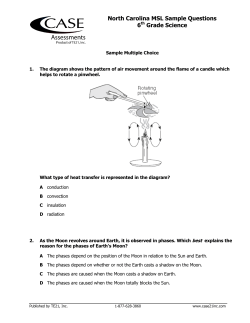
5th Grade Science Sample Questions
5th Grade Science Sample Questions Name: ____________________________________________ 1) The picture below shows the landing of an American astronaut on the Moon. 3) Fossils of turtles, such as the one shown, prove that many species of turtles have not changed over millions of years. The most likely reason that turtles have not changed is ‡‡ The American flag shown on the Moon required a support rod at the upper edge to hold the flag out. What characteristic of the Moon's environment makes this necessary? A) their environments are very different now compared to millions of years ago. B) their environments did not change and they were able to survive. C) they have easily adapted to new environments without changing. D) their predators eliminated all of the turtles with adaptations. 4) A) The Moon's atmosphere is much thicker than the Earth's, so the flag needs extra support. B) The strong winds on the Moon might blow the flag too hard. C) The gravity on the Moon is greater than the Earth's, so the flag needs extra support. D) The Moon has no weather and no wind to blow the flag. 2) Insecticides and pesticides are helpful to farmers because they prevent crop damage. A disadvantage 5) of insecticides and pesticides is that they ‡‡ A) B) C) D) change the salt levels in oceans. cause more severe weather conditions. can pollute nearby rivers and lakes. increase erosion on farmland. In an experiment, a block of wood, a hard-boiled egg, and a cork were placed in a beaker of water. The egg fell straight to the bottom, the block floated just below the water's surface, and the cork floated mostly on top of the water's surface. Which one of the following had the greatest density? A) Water B) Hard-boiled egg C) Block of wood D) Cork Imagine you are the lucky winner of a contest that sends you to the Moon. Describe what the journey is like and what things you observe about the Moon when you get there. 6) 7) The kapok tree survives in the rainforest because it 10) is about 200 feet tall. How does this adaptation help it to survive? A) It allows the tree to release oxygen. B) It allows the tree to get much needed sunlight. C) It allows all types of fruit to grow on the tree. D) It gives the tree room to grow. In order to survive, an organism must ‡‡ A) sense and respond to changes in its environment. B) be able to produce its own food. C) be the highest organism in the food pyramid. D) have high intelligence. 8) Buoyancy is determined by an upward force exerted by a liquid or gas that opposes the density of an immersed object and the gravity acting upon it. (a) Design an experiment that illustrates this principle of buoyancy by comparing the densities of two different objects. (b) How do you believe this experiment might change when repeated at a higher elevation? A student is studying actions and reactions. She carries out an experiment to test how high a ball will bounce if she drops it from various heights. The chart below shows the results. 11) Which of the following processes must the mosquito undergo in order to complete its life cycle? Using the data in the chart, what is the best prediction of how high the ball will bounce when it is dropped from a height of 150 cm? A) 50 cm C) 60 cm B) 30 cm D) 100 cm 9) Which is the correct order of soil particles from smallest to largest? A) B) C) D) Silt ‚ Sand ‚ Clay ‚ Gravel Gravel ‚ Sand ‚ Silt ‚ Clay Clay ‚ Silt ‚ Sand ‚ Gravel Clay ‚ Sand ‚ Silt ‚ Gravel A) B) C) D) Larva Pupa Hibernation Metamorphosis Answer Key 2963 - 1 - Page 1 5TH GRADE SCIENCE, Ch 8 #80 Stds: (NY) PS.1.1g 1) D 5TH GRADE SCIENCE, Ch 7 #143 Stds: (NY) LE.7.2d 2) C 5TH GRADE SCIENCE, Ch 3 #92 Stds: (NY) LE.3.2b, LE.3.2c 3) C 5TH GRADE SCIENCE, Ch 10 #92 Stds: (NY) PS.3.1h, PS.3.1i 4) B 5TH GRADE SCIENCE, Ch 8 #134 Stds: (NY) PS.1.1g, RI.5.4, RI.5.10, W.5.2, W.5.4, W.5.8 5) Answers may vary. 5TH GRADE SCIENCE, Ch 3 #26 Stds: (NY) LE.3.1b 6) B 5TH GRADE SCIENCE, Ch 5 #57 Stds: (NY) LE.5.1g 7) A 5TH GRADE SCIENCE, Ch 12 #29 Stds: (NY) PS.5.1e 8) A 5TH GRADE SCIENCE, Ch 9 #80 Stds: (NY) PS.2.1h 9) C 5TH GRADE SCIENCE, Ch 10 #176 Stds: (NY) PS.3.1i, RI.5.4, RI.5.10, W.5.2, W.5.4, W.5.8 10) Answers may vary. 5TH GRADE SCIENCE, Ch 4 #66 Stds: (NY) LE.4.3d 11) D
© Copyright 2025



















